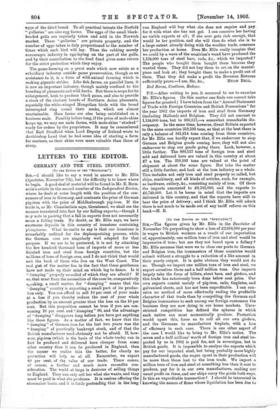LETTERS TO THE EDITOR.
GERMANY AND THE STEEL INDUSTRY.
[To THY EDITOR OF TER "SPECTATOL"]
Siu,—I should like to say a word in answer to Mr. Ellis (Spectator, November 7th), but the difficulty is to know where to begin. A good deal of material will be found in Mr. E. Bern- stein's article in the second number of the Independent Review, where he deals at some length with the position of the con- sumers of iron in Germany, and contrasts the price of German pig-iron with the price of Middlesbrough pig-iron. If the trade is, as Mr. Chamberlain says, threatened, we shall see the menace translated into fact by our falling exports,—though I m Ly note in passing that a fall in exports does not necessarily mean, a failing trade. No doubt, as Mr. Ellis says, we have enormous deposits in this country of ironstone containing phosphorus. What he omits to say is that our ironstone is remarkably unfitted for the dephosporising process, while the German ores are singularly well adapted for that purpose. If we are to be protected, it is not by attacking the few hundred thousand tons of imports of more or less finished iron and steel from foreign countries, but the millions of tons of foreign ores, and I do not think that would suit the book of those who live on the West Coast. The real, gist of the matter lies in the fact that these gentlemen have not made up their mind on which leg to dance. Is it " dumping" properly so-called of which they are afraid ? If so, that must from the necessities of the case be, comparatively speaking, a small matter, for " dumping " means that the
dumping " country is exporting a small part of its produc- !;ion only. You can afford to sell 10 per cent. of your make at a loss if you thereby reduce the cost of your whole production by an amount greater than the loss on the 10 per cent. But this proposition cannot be true if you are con- suming 10 per cent. and " dumping " 90, and the advantage of " dumping " disappears long before you have got anything like these figures. As a matter of fact, we know that the dumping " of German iron fur the last two years was the " dumping " of practically bankrupt stock, and of that the British manufacturer need obviously not be afraid. If, how- ever, pig-iron (which is the basis of the whole trade) can in fact be produced and delivered here cheaper from some other country than it can be produced in England, then the sooner we realise this the better, for clearly no protection will help us at all. Remember, we export 40 per cent. of the value of our trade. There comes, of course, a further and much more recondite con- sideration. The world at large is desirous of selling things to England. They can only sell her what she wants, and they must be paid in what she produces. It is useless offering the shoemaker boots. and it is futile pretending that in the long
run England will buy what she does not require and pay . for it with what she has not got. I can conceive her having no visible exports at all; if she ever gets rich enough, that would be her position, and she will then do what she is to a large extent already doing with the woollen trade, consume her production at home. Does Mr. Ellis really imagine that we could by a wave of the magician's wand have produced the 1,134,000 tons of steel bars, rods, &c., which we imported ? The people who bought them bought them because they wanted them. They did not buy them to set on the mantel- piece and look at; they bought them to make a profit out of them. That they did make a profit the Revenue Returns sufficiently prove.—I am, Sir, &c., HUGE BELL. Red Barns, Coatham, Redcar.
P.S.—After writing to you, it occurred to me to examine Mr. Ellis's figures. (In this matter one finds one cannot take figures for granted.) I have taken from the "Annual Statement of Trade with Foreign Countries and British Possessions" for the year 1902 the imports of iron and steel from Germany (including Holland) and Belgium. They did not amount to 1,134,000 tons, but to 880,117,—a somewhat remarkable dis- crepancy. In the same time, however, Great Britain exported to the same countries 318,503 tons, so that at the best there is only a balance of 561,614 tons coming from these countries, for Mr. Ellis can hardly expect that, if we endeavour to stop German and Belgian goods coming here, they will not also endeavour to stop our goods goine. there. Look, however, a little further. The 880,117 tons of foreign iron and steel sold and delivered here are valued in this country at about £7 a ton. The 318,503 tons are valued at the point of shipment at about the same figure. But take the matter still a little further, and look at the iron industry as a whole. This includes not only iron and steel properly so called, but ships, machinery, and all kinds of articles, such, for example, as hardware, cutlery, &c., consisting mainly of iron. Of these the imports amounted to 28.102,000, and the exports to £6,749,000. Let it be borne in mind that the imports are delivered in this country, and that the exports have still to bear the price of delivery; and I think Mr. Ellis will admit there is not much to be made out of any tariff reform on this head.—H. B.














































 Previous page
Previous page